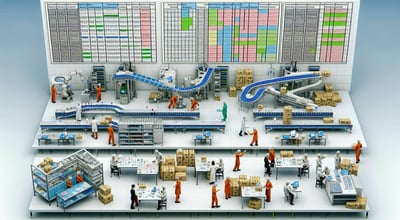Optimizing Multi-Tier Supplier Scheduling Coordination
Production schedulers play a pivotal role in orchestrating the flow of materials and resources across the supply chain to meet demand efficiently in medical manufacturing. However, in today's complex landscape, where supply chains span multiple tiers of suppliers, achieving seamless coordination poses significant challenges.
This blog aims to look into the nuances of multi-tier supplier scheduling coordination, offering insights and strategies tailored to production schedulers in medical manufacturing facilities. Furthermore, we'll explore the integration of advanced planning and scheduling (APS) tools like PlanetTogether with leading Enterprise Resource Planning (ERP), Supply Chain Management (SCM), and Manufacturing Execution Systems (MES), such as SAP, Oracle, Microsoft, Kinaxis, and Aveva, to streamline operations.

Multi-Tier Supplier Scheduling
Multi-tier supplier scheduling involves synchronizing production activities across various levels of the supply chain, from raw material suppliers to final assembly. In the context of medical manufacturing, where precision and compliance are paramount, any disruption in the supply chain can have serious consequences.

Challenges in Multi-Tier Supplier Scheduling
Complexity: Managing multiple suppliers, each with its own lead times, capacities, and constraints, adds layers of complexity to scheduling.
Uncertainty: Fluctuations in demand, supply shortages, and unexpected disruptions further complicate the scheduling process, making it challenging to maintain optimal inventory levels and meet delivery deadlines.
Communication: Effective communication and collaboration among stakeholders across different tiers of the supply chain are essential but often hindered by siloed systems and disparate data sources.
Risk Mitigation: Ensuring continuity of supply while minimizing risks associated with quality control, compliance, and regulatory requirements demands proactive risk mitigation strategies.


Strategies for Effective Coordination
Data Integration: Integrating APS solutions like PlanetTogether with ERP, SCM, and MES systems enables real-time data exchange, providing production schedulers with a unified view of the supply chain. This integration facilitates accurate demand forecasting, capacity planning, and inventory optimization.
Demand Visibility: By leveraging advanced analytics and predictive modeling, production schedulers can gain insights into demand patterns and anticipate fluctuations, allowing for proactive adjustment of production schedules and inventory levels.
Supplier Collaboration: Establishing collaborative relationships with key suppliers fosters transparency and agility in the supply chain. Joint planning sessions, shared forecasts, and continuous communication help align production schedules and mitigate risks.
Scenario Planning: Using simulation and "what-if" analysis capabilities offered by APS tools, production schedulers can evaluate various scenarios and assess the impact of potential disruptions. This proactive approach enables better decision-making and risk management.
Continuous Improvement: Implementing a culture of continuous improvement and lean manufacturing principles enhances efficiency and responsiveness across the supply chain. Regular performance monitoring, feedback loops, and process optimization drive operational excellence.

Integration with Leading ERP, SCM, and MES Systems
Integrating APS solutions like PlanetTogether with industry-leading ERP, SCM, and MES systems enhances the effectiveness of multi-tier supplier scheduling coordination in medical manufacturing. Let's explore how this integration adds value:
SAP Integration: Seamless integration with SAP ERP enables production schedulers to leverage SAP's robust supply chain management capabilities, including procurement, inventory management, and order fulfillment. Real-time data synchronization ensures accurate demand planning and execution, improving overall supply chain efficiency.
Oracle Integration: Integrating with Oracle SCM Cloud provides production schedulers with end-to-end visibility and control over the supply chain. By combining PlanetTogether's advanced scheduling algorithms with Oracle's comprehensive suite of SCM solutions, manufacturers can optimize production schedules, minimize lead times, and reduce costs.
Microsoft Integration: Integration with Microsoft Dynamics 365 SCM empowers production schedulers with a unified platform for planning, execution, and collaboration. Leveraging PlanetTogether's advanced planning capabilities alongside Microsoft's cloud-based ERP solution enables agile decision-making and adaptive supply chain management.
Kinaxis Integration: Integrating with Kinaxis RapidResponse enables production schedulers to create responsive and resilient supply chains. By synchronizing data between PlanetTogether and Kinaxis, manufacturers can orchestrate multi-tier supplier scheduling with greater agility, enabling rapid adaptation to changing market conditions.
Aveva Integration: Integration with Aveva MES enhances visibility and control over manufacturing operations, enabling seamless coordination with upstream suppliers. By connecting PlanetTogether with Aveva's MES solutions, production schedulers can optimize production schedules based on real-time shop floor data, ensuring alignment with demand and capacity constraints.
In medical manufacturing, effective multi-tier supplier scheduling coordination is essential for maintaining operational efficiency, meeting customer demands, and ensuring regulatory compliance. By leveraging advanced planning and scheduling tools like PlanetTogether and integrating them with leading ERP, SCM, and MES systems, production schedulers can orchestrate the flow of materials and resources across the supply chain with precision and agility.
With proactive strategies, collaborative partnerships, and continuous improvement initiatives, manufacturers can navigate complexities, mitigate risks, and achieve sustainable success in today's competitive landscape. Are you ready to take your manufacturing operations to the next level? Contact us today to learn more about how PlanetTogether can help you achieve your goals and drive success in your industry.